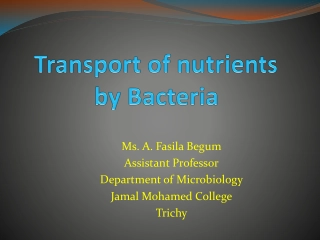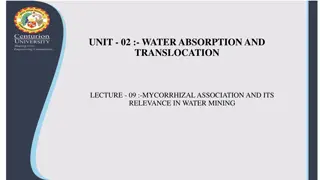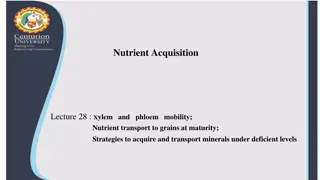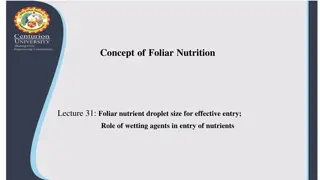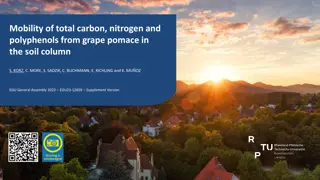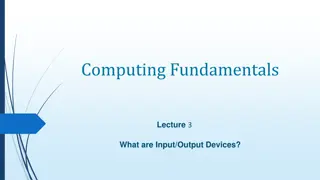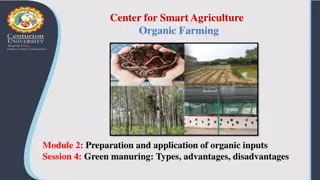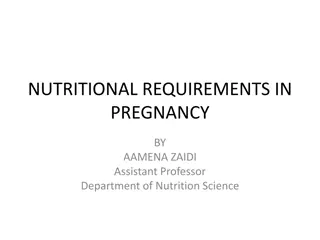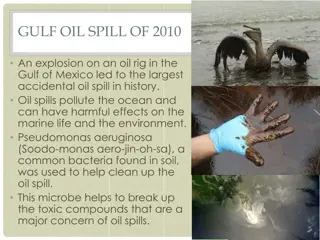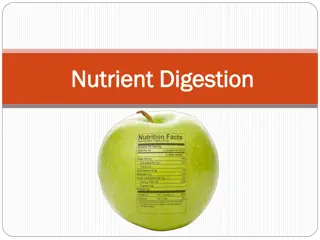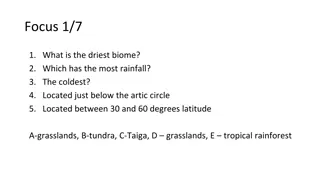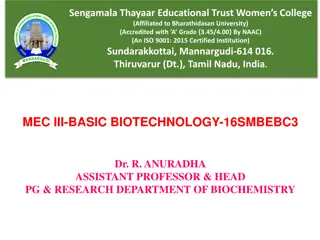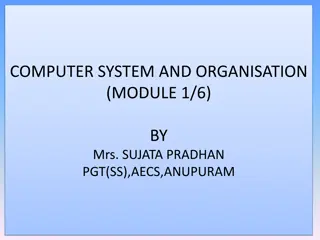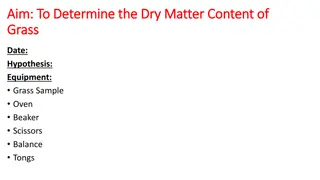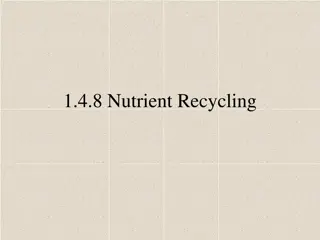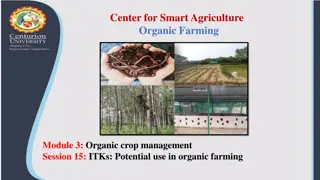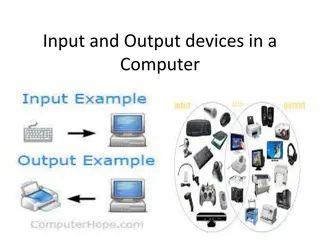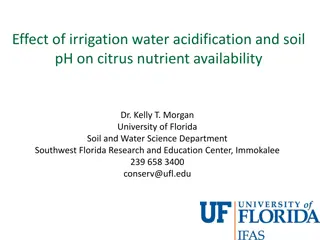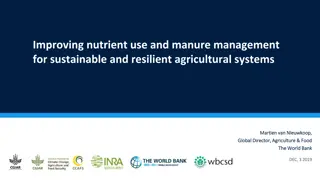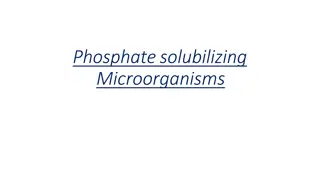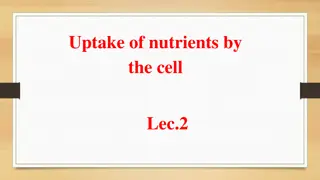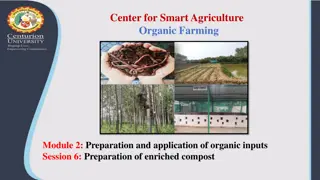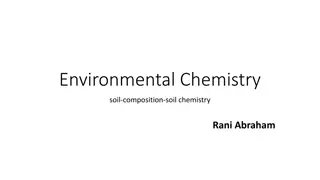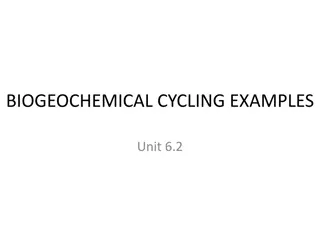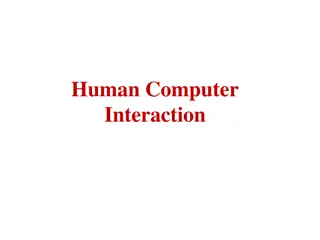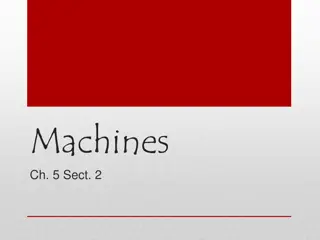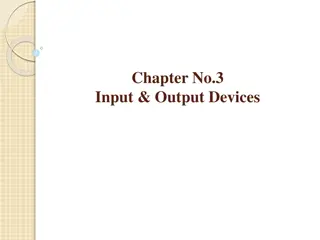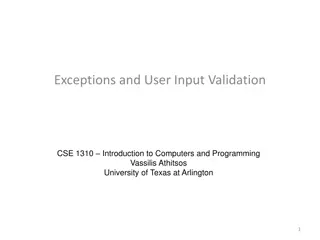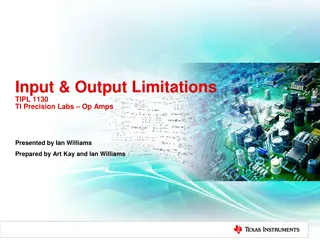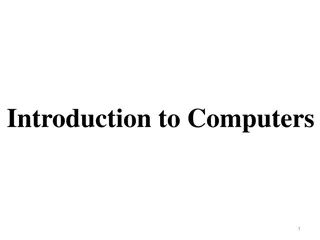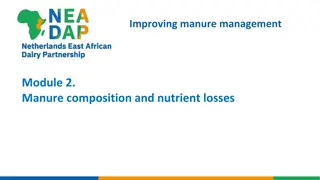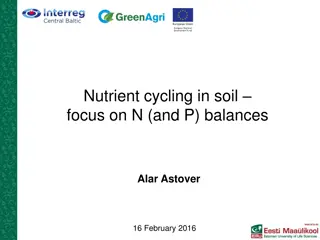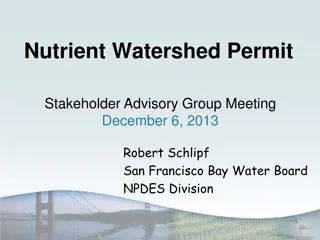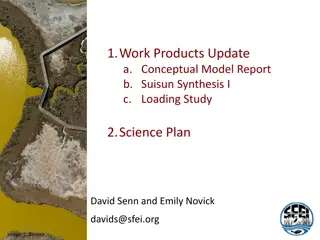Nutrient Uptake in Bacteria: Mechanisms and Factors
The process of nutrient uptake in bacteria, including the role of macronutrients, micronutrients, and environmental factors. Learn about the different mechanisms of nutrient transport and the importance of selective permeability in plasma membranes.
0 views • 25 slides
Mycorrhizal Association and Its Importance in Water Mining
Mycorrhizal association plays a crucial role in facilitating nutrient and water absorption for plants through a symbiotic relationship with fungi. This relationship enhances the plant's ability to acquire minerals from the soil while providing essential compounds to the fungi. The mycorrhizal associ
4 views • 6 slides
Nutrient Acquisition
Plants utilize xylem and phloem to transport water, nutrients, and minerals throughout their structures. Xylem moves water and mineral salts from roots to leaves, while phloem transports sugars and amino acids from leaves to the rest of the plant. Nutrient acquisition involves passive and active tra
2 views • 6 slides
Concept of Foliar Nutrition
Explore the crucial concepts of foliar nutrition, including the role of droplet size in nutrient entry and the importance of wetting agents in optimizing nutrient absorption in plants. Discover how smaller droplets enhance efficiency while avoiding drift, and how wetting agents facilitate water upta
0 views • 8 slides
Grape Pomace Utilization in Soil Nutrient Management Study
Study on the mobility of total carbon, nitrogen, and polyphenols from grape pomace in soil columns, focusing on its relevance as an organic fertilizer rich in nutrients. The research also highlights the industrial potential of grape pomace, nutrient mobility between varieties, and methods used for c
1 views • 14 slides
Understanding Input and Output Devices in Computing
In computing, input and output devices play a crucial role in enabling communication between users and computers. Input devices are used to enter data into a computer, while output devices display or provide the results of processed information. Common input devices include keyboards, mice, and joys
0 views • 17 slides
Understanding Green Manuring in Organic Farming: Types, Advantages, and Disadvantages
Green manuring involves incorporating green plant tissues into the soil to enhance fertility and structure. This method includes types like in-situ and green leaf manuring. Desirable qualities of a good green manuring crop are quick growth, nutrient fixation, and deep root systems. Advantages includ
0 views • 7 slides
Understanding Nutritional Requirements in Pregnancy by Aamena Zaidi
Adequate nutrition before and during pregnancy is crucial for long-term maternal and fetal health. Maternal health is influenced by genetic, social, and economic factors, impacting physiological adaptations for better nutrient utilization. Physiological changes in pregnancy include increased total p
0 views • 41 slides
The Role of Soil Microbes in Nutrient Recycling
Soil microbes such as bacteria, protozoa, and nematodes play a crucial role in nutrient recycling by breaking down organic matter, releasing nutrients for plant growth, and aiding in the decomposition process. These microscopic organisms help maintain soil health and ecosystem balance, highlighting
0 views • 16 slides
Understanding Nutrient Digestion and Absorption Process
Nutrients in food provide essential materials and energy for our body to function. During digestion, large molecules are broken down into smaller pieces for absorption. Enzymes play a crucial role in this breakdown process, with each enzyme being specific to a certain type of nutrient. Carbohydrates
1 views • 14 slides
Exploring Tropical Rainforests: A Diverse and Vital Ecosystem
Tropical rainforests, found near the equator, boast immense biodiversity and play crucial roles in regulating global climate and nutrient cycles. These forests thrive in humid, warm conditions with ample sunlight. Nutrients are primarily found in plants rather than the soil, and their efficient nutr
0 views • 27 slides
Understanding Blue-Green Algae: Cultivation, Nutrient Composition, and Properties
Blue-green algae, also known as cyanobacteria, are photosynthetic bacteria that thrive in warm, nutrient-rich water bodies. They are packed with essential nutrients like vitamins, minerals, and amino acids, making them a valuable resource for overall health. Learn about the cultivation, uses, and hi
1 views • 21 slides
Understanding Computer System and Organization
Computer Organization involves the logical structure of a computer, defining the interconnections of components for optimal performance. Computers process data through an Input-Process-Output cycle, with input, processing, and output units working together. The characteristics of a computer include
1 views • 20 slides
Determining Dry Matter Content of Grass: A Comprehensive Study
The study aims to determine the dry matter content of grass using a detailed method involving sample preparation, oven drying, and calculations. By following the outlined procedure, the dry matter percentage of grass samples can be accurately measured, providing valuable insights into nutrient compo
5 views • 5 slides
Nutrient Recycling in Ecosystems
Nutrient recycling in ecosystems involves the continuous breakdown and exchange of elements between living and non-living components, ensuring sustainability and no long-term drain on Earth's nutrients. This process includes decomposition of organic material by bacteria and fungi, uptake of nutrient
1 views • 23 slides
Indigenous Technical Knowledge in Organic Farming: Sustainable Practices and Nutrient Management
Indigenous Technical Knowledge (ITK) plays a crucial role in organic farming by providing sustainable practices passed down through generations. Farmers in regions like Orissa, West Bengal, Tamil Nadu, and Rajasthan utilize ITK for nutrient management, intercropping, green manuring, and addressing a
0 views • 8 slides
Understanding Input and Output Devices in a Computer
Input devices play a crucial role in sending data to a computer, allowing users to communicate instructions for processing, display, storage, and transmission. Key input devices include keyboards and mice, each serving specific functions and enhancing data collection and accuracy. Discover the advan
0 views • 17 slides
Understanding Citrus Nutrient Availability in Relation to Soil pH and Irrigation Water Acidification
This research by Dr. Kelly T. Morgan from the University of Florida explores the impact of soil pH, irrigation water acidification, and nutrient recommendations on citrus trees affected by HLB disease. The study examines the availability of key nutrients such as Mn and Zn, the effects of different s
0 views • 23 slides
Enhancing Nutrient Efficiency in Agriculture for Sustainable Systems
Improved nutrient use and manure management are crucial for sustainable agricultural systems. Efforts to increase nutrient efficiency through better practices can help reduce emissions and aquatic pollution. Public awareness, policy realignment, and soil data quality enhancements are key areas for p
0 views • 14 slides
Harnessing Phosphate-Solubilizing Microorganisms for Sustainable Crop Growth
Phosphorus is crucial for plant growth, but its availability is often limited due to insoluble forms in soil. The use of phosphate-solubilizing microorganisms (PSMs) can help convert insoluble phosphorus into a usable form for plants. This process involves isolating, screening, and mass-producing PS
0 views • 6 slides
Mechanisms of Nutrient Uptake by Microbial Cells
Nutrient uptake by microbial cells involves various transport mechanisms such as passive diffusion, facilitated diffusion, active transport, and group translocation. These mechanisms ensure the specific acquisition of required nutrients by the cell through the selectively permeable plasma membrane.
3 views • 15 slides
Enhancing Compost Quality for Organic Farming: Phosphorous-Enriched Compost Preparation
Composting is a natural process crucial for organic farming. Enriched compost improves nutrient supply to crops. Learn how to prepare phosphorous-enriched compost using organic wastes, bio-inoculants, and rock phosphate. Follow a method involving layering organic materials, cow dung, and rock phosph
3 views • 8 slides
Understanding Soil Chemistry and Redox Reactions in Environmental Chemistry
Soil chemistry plays a crucial role in sustaining healthy soils by influencing nutrient availability through oxidation and reduction processes. Redox reactions in soil are impacted by factors like oxygen content and water presence, affecting nutrient supplies. The redox status of soil reflects its n
1 views • 92 slides
Understanding Nutrient Pollution and Its Impact on the Environment
Nutrient pollution, characterized by the excess input of nitrogen and phosphorus into water and air, is a significant environmental issue with far-reaching consequences. It can lead to toxic algae blooms, dead zones, economic losses, and adverse effects on human health. The causes of nutrient pollut
2 views • 11 slides
European Standards for Plant Biostimulants Development
The European Committee for Standardization (CEN) plays a crucial role in developing European standards for plant biostimulants, focusing on improving plant nutrition processes independently of nutrient content. The CEN/TC.455 committee is responsible for creating standards supporting the EU Fertilis
2 views • 5 slides
Understanding Human-Computer Interaction and Input Devices
Human-Computer Interaction involves the interaction between users and computers, exploring various input devices such as keyboards, handwriting recognition, and pointing devices. Learn about the evolution from batch data entry to modern forms of interaction, including speech recognition and stylus i
0 views • 12 slides
Understanding Machines: Work, Forces, and Efficiency
Machines play a vital role in making work easier by increasing force, distance, or changing the direction of applied force. Different types of machines like levers, pulleys, and inclined planes simplify work processes. Understanding input and output forces, as well as input and output work, is essen
1 views • 10 slides
Understanding Input and Output Devices in Computers
Input devices like keyboards, mice, joysticks, light pens, scanners, and more play a crucial role in interacting with computers. This chapter explores the functions and features of various input devices used in computing, such as keyboards for data input, mice for cursor control, and joysticks for C
0 views • 12 slides
Understanding Interactive Programs and Input/Output in Java
Interactive programs in Java allow users to input data through the console, which can be captured and used in the program. This involves using the Scanner class to read user input, and understanding common Scanner methods to process different types of input. Importing Java class libraries is essenti
2 views • 15 slides
Input Validation in Java Programming: Handling Exceptions and User Input
Learn how to implement input validation in Java programming to prevent crashes when users provide invalid input. Explore strategies for handling exceptions like InputMismatchException and the importance of reading strings directly from user input. Discover methods for converting strings to numbers a
1 views • 33 slides
Understanding Input and Output Limitations in Op Amps
Explore the various input and output limitations in TI Precision Labs Op Amps as presented by Ian Williams and prepared by Art Kay and Ian Williams. Delve into common mode voltage, voltage swing, data sheet parameters translation, input and output stages, examples of common mode voltage, and potenti
0 views • 15 slides
Nutrient Criteria Development Plan for High Rock Lake Summary Update
Nutrient Criteria Development in North Carolina has evolved through various stages since 2001, with the key milestones being the development of the Nutrient Criteria Implementation Plan in 2004 and the Nutrient Criteria Development Plan in 2014. The plan aims to link nutrient concentrations with the
0 views • 8 slides
Iowa Nutrient Pollution Control Measures and Strategies
Gulf Restoration Network Decision, sources of Nutrients Nitrogen (N) and Phosphorus (P), impacts of Nutrient Pollution leading to Algae Blooms and Gulf Hypoxia (Dead Zone), measures to reduce Non-Point Source (NPS) contamination, EPA's current strategy, and Iowa's approach with its Nutrient Reductio
0 views • 20 slides
Understanding Scanner Class in Java: Reading User Input and Processing Files
The Scanner class in Java's java.util package allows reading input from the keyboard or files. It looks for tokens in the input, reads different types of values, and has methods like nextInt() and nextLine(). You can also read from files by creating a File object. Learn how to use Scanner to interac
0 views • 21 slides
Introduction to Computers: Understanding Hardware and Input Devices
Computers are electronic devices that process input to produce information. They consist of hardware components like CPUs, input/output units, and memory. Input devices such as keyboards, mice, and scanners help translate human-readable data for computer processing.
0 views • 11 slides
Understanding Manure Management: Compositions, Nutrient Losses, and Factors
Explore the complexities of manure management by delving into manure compositions, nutrient losses, and the various factors influencing the quality and quantity of manure. Learn about the impact of animal species, diets, and management practices on manure characteristics, as well as strategies to mi
0 views • 29 slides
Understanding Nutrient Cycling in Soil for Sustainable Agriculture
Explore the intricate processes of nutrient cycling in soil, with a focus on nitrogen (N) and phosphorus (P) balances. Discover the various inputs and outputs considered within different scales, from field to country level. Gain insights into the importance of interpreting data correctly and the imp
0 views • 22 slides
Nutrient Watershed Permit Stakeholder Advisory Group Meeting Overview
The Nutrient Watershed Permit Stakeholder Advisory Group Meeting on December 6, 2013, discussed permit components, effluent monitoring, annual reporting, treatment optimization, nutrient studies, monitoring, reporting, support for nutrient studies, treatment plant optimization, and permit timeline.
0 views • 6 slides
Nutrient Conceptual Model Review Summary
Comments and feedback on a Nutrient Conceptual Model report include suggestions to address issues related to eutrophication concepts, nutrient stoichiometry, community composition, and nutrient reduction goals. Recommendations also focus on incorporating flushing/residence time discussions, predicti
0 views • 9 slides
Understanding File Input/Output (I/O) in C++
File Input/Output (I/O) is an essential concept in C++ programming, allowing for interaction with files stored on secondary storage devices. This involves steps like including the fstream header file, declaring file stream variables, associating them with input/output sources, opening the file, perf
0 views • 19 slides
